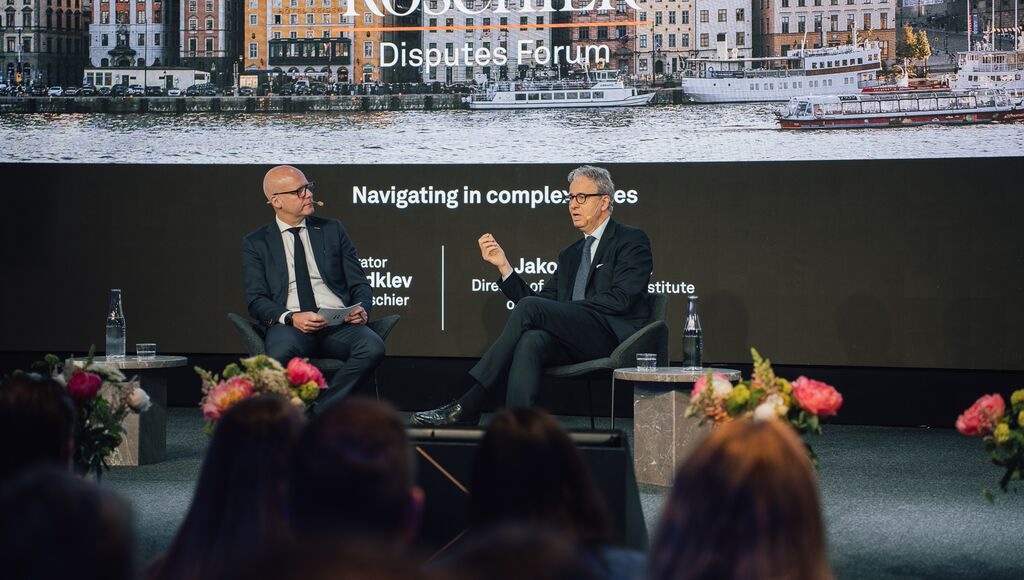
Navigating a new global disorder: Insights from Jakob Hallgren
Insights|June 9, 2025
As global power shifts, media fragments, and new conflicts arise, understanding international affairs is increasingly complex. This discussion examined how to navigate today’s geopolitical landscape, the overlap between media and intelligence, and Europe’s potential role in a changing world order.
Johan Sidklev hosted a conversation with Jakob Hallgren, Director of the Swedish Institute of International Affairs. Jakob, a former ambassador and long-serving diplomat, shared insights from a career that has taken him from humanitarian work to conflict resolution and most recently a posting in South Korea. Asked how he personally keeps up with the ever-accelerating pace of global news and policy changes, Jakob credited the value of his team’s reports, seminars, and informal discussions. “I’m grateful for my colleagues who produce reports, arrange seminars, and facilitate meaningful interactions,” he said.
Behind the headlines
Jakob described his daily news routine, which includes scanning up to 15 sources – not just to stay informed, but to detect the agendas behind the stories. “We have been forced to become news addicts. What was true yesterday may not be true today,” he said. As an example, he referenced a leak involving a Signal chat between a U.S. national security advisor and a journalist about a military strike in Yemen. “The Vice President’s tone was very condescending toward Europeans. It confirmed the fears we have about how we’re perceived at those levels in the U.S.”
Jakob also recalled watching Fox News during his time in New York at the start of Donald Trump’s presidency. “After five minutes, my suspicions were confirmed,” he said, referring to the channel’s editorial angle. When asked how he evaluates more commercially driven media, Jakob emphasized that while Nordic media may fare better, neutrality is a myth. He cited the lead-up to Russia’s invasion of Ukraine in early 2022 as an example of intelligence misjudgment. Many European countries believed Russia lacked the intention to invade, even if the capacity was present. “We based our assessments on our own moral standards and underestimated Russia’s willingness to sacrifice lives,” he said.
A changed world order
Johan turned the conversation to the shifting dynamics of global power. Jakob explained that the unipolar era following the Cold War – when the United States dominated the international agenda – has ended. “China has emerged with a comparable GDP and is building its military. For the first time in a long time, the U.S. has a real competitor,” he said. Russia, and at times countries like Turkey, South Africa and Indonesia, are aligning with Chinese views. “Europe stands in the middle. We have shared values and a common market, but we’re not used to operating under great power politics.”
Could the European Union, perhaps with the United Kingdom, rise to fill the gaps left by a more inward-looking U.S.? Jakob said that leaders are increasingly aware of the need for deeper cooperation. He pointed to the upcoming NATO meeting in The Hague, where discussions about dramatically increased defense spending are expected. “Trump has suggested 5% of GDP for defense. A more likely outcome is 3.5% for defense and 1.5% for infrastructure and resilience,” he said. He also observed that while the U.S. has long resisted a strong EU, Europe today is in a financial position to invest in its own security.
Business in the new normal
Reflecting on a recent meeting where Trump invited the South African president to the Oval Office, Jakob said it suggests a narrow worldview focused on China, with little regard for Africa. “That’s dangerous. The Global South could lean toward Chinese and Russian narratives if neglected,” he said. This shift reflects a return to realism in foreign policy, where military and economic strength drive diplomacy. “Trump believes in personal relationships more than institutions. He thinks the EU was set up to screw the U.S.”
Jakob warned that bilateral dealings – rather than engaging with the EU as a bloc – play into the hands of Beijing and Moscow. The only real supranational power the EU holds is its trade policy, which he said remains “tough for the Americans to crack.” If Europe presents a united front, it can still wield influence. “If the EU retaliates against U.S. tariffs, it will sting,” he said.
Johan then turned the focus to business. How can companies operate in an environment where transparency and regulatory certainty are no longer guaranteed? Jakob acknowledged that while much trade continues, it is under pressure. “You must monitor geopolitical shifts daily. The U.S. depends on China, China on the U.S., and both on the EU.” He stressed the need for businesses to assess their dependencies and prepare for disruptions. “We are all agents in history. Each generation has a responsibility to learn from the past and do its utmost to prevent unpleasant outcomes.”